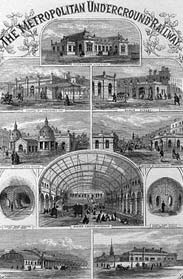Oral History of Mashhad Subway in the First Station
Gholam Reza Azari Khakestar
Translated by: Maryam Shally
2015-8-1
In commemoration of Subway opening day in Mashhad (Winter 89)
Expansion of population and cities have led to the subject of municipal traffic and become the most important concern for municipal managers. Subway is one of the underground public transportation systems that has an outstanding role in transporting of passengers and obviating the traffic jam.
* Subway background in the world dates back to the January 10th in 1863(1). In this year the oldest underground public transportation system in the world has been exploited in London. The first London subway line was metropolitan that was started in the center of this city. About 147 years after metropolitan, the first subway was established in Mashhad (A Religious Metropolis in Khorassan, Iran). Comprehensive transportation researches in Mashhad were done between 1994 and 1999 by Transportation Institute of Sharif Industrial University due to the traffic problems and passengers’ transporting. Studies show that, Mashhad requires a 4-line subway. Executive operation of the first line was started in the mid-2000. Establishment of the first line (from Vakil Abad to Nakhrisi Square) was finished in 2007 and also, this line was exploited after ten years in March 2010. The passengers are served 16 hours in a day by the first line with 170.000 capacities.
Issues and management experience on subway caused to form subway oral history plan in Mashhad based on the memories and experience of managers, developers and crews of this project. The goal of subway oral history plan in Mashhad and interviewing with operating staff is recording their experience and knowledge in order to modify the interviews to valuable sources for researches and managers in this realm to help the history and recording of this industry.
The most important aims of this plan are:
1. The importance of specifying subway in public transportation of Mashhad
2. Subway role in expansion of Mashhad Municipal
3. Specifying the way of plan operation
4. Consultant and developers’ role in operating Mashhad subway project
5. Interviewing with establisher of Mashhad subway
6. Making photo, interview and document archive
Establishing of Mashhad subway and its wagon manufacturing process, expenses and manager experience are considered by oral history. Researching process of this plan has been finished and the initial interviews are being done by oral history experts who most of them are history post-graduate and Ph.D. candidates. After interviews, implementation and editing of plan outcome will be published and distributed.

Note:
(1) On 10 January 1863, The Metropolitan Railway opens the world's first underground railway, between Paddington (then called Bishop's Road) and Farringdon Street.
Montage of the Metropolitan Railway's stations from Illustrated London News December 1862, the month before the railway opened
Number of Visits: 7362








The latest
- A Critical Look at Pioneers of the Valley of Light
- The Artillery of the Islamic Revolutionary Guard Corps
- Translation in Oral History and Its Potential Pitfalls
- 100 Questions/14
- Third Regiment: Memoirs of an Iraqi Prisoner of War Doctor – 14
- Analysis and classification of oral literature of resistance using emerging technologies
- 100 Questions/13
- Preface and Introduction in Oral History Books
Most visited
- Translation in Oral History and Its Potential Pitfalls
- Oral History of 40 Years
- Analysis and classification of oral literature of resistance using emerging technologies
- Third Regiment: Memoirs of an Iraqi Prisoner of War Doctor – 13
- The Artillery of the Islamic Revolutionary Guard Corps
- 100 Questions/13
- Preface and Introduction in Oral History Books
- Third Regiment: Memoirs of an Iraqi Prisoner of War Doctor – 14
100 Questions/8
We asked several researchers and activists in the field of oral history to express their views on oral history questions. The names of each participant are listed at the beginning of their answers, and the text of all answers will be published on this portal by the end of the week. The goal of this project is to open new doors to an issue and promote scientific discussions in the field of oral history.The Role of Objects in Oral Narrative
Philosophers refer to anything that exists—or possesses the potential to exist—as an object. This concept may manifest in material forms, abstract notions, and even human emotions and lived experiences. In other words, an object encompasses a vast spectrum of beings and phenomena, each endowed with particular attributes and characteristics, and apprehensible in diverse modalities.100 Questions/6
We asked several researchers and activists in the field of oral history to express their views on oral history questions. The names of each participant are listed at the beginning of their answers, and the text of all answers will be published on this portal by the end of the week. The goal of this project is to open new doors to an issue and promote scientific discussions in the field of oral history.The Importance of Pre-Publication Critique of Oral History Works
According to the Oral History website, a meeting for critique and review of the book “Oral History: Essence and Method” was held on Monday morning, November 10, 2025, with the attendance of the book’s author, Hamid Qazvini, and the critics Mohammad Qasemipour and Yahya Niazi, at the Ghasr-e Shirin Hall of the National Museum of the Islamic Revolution and Sacred Defense.

